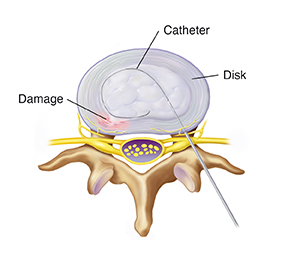How Electrothermal Catheter Therapy Works
Low back and leg pain is often because of damage to 1 or more of the disks between the vertebrae. Electrothermal therapy uses heat to change the structure of the tissue inside the disk. It doesn’t relieve pain right away. Pain is reduced as the disk heals. After healing, the disk may also be stronger and more stable than before. This treatment is also called intradiscal electrothermal therapy.
Inside the disk
First, a needle is inserted into the disk. Then a special flexible wire (catheter) is threaded through the needle, so that it curves around the inside of the disk. When the catheter is in place, part of it is next to the damage in the disk.
 |
| The catheter is threaded through a needle into the disk. |
Heating the disk
Once the catheter is in place, it's heated slowly to a high temperature. The catheter is kept at that temperature for a few minutes. Then it's removed. The heat may deaden nerves in the disk, preventing these nerves from causing pain. The heat may also make the disk shrink. This may mean that the disk no longer presses on nerves. The heated tissue will slowly heal over the next few months and form scar tissue. This scar tissue may:
Risks and possible complications
The risks and complications of electrothermal catheter therapy include:
Online Medical Reviewer:
Jennifer Ciccone NP
Online Medical Reviewer:
Jessica Gotwals RN BSN MPH
Online Medical Reviewer:
Sravani Chintapalli
Date Last Reviewed:
9/1/2024
© 2000-2025 The StayWell Company, LLC. All rights reserved. This information is not intended as a substitute for professional medical care. Always follow your healthcare professional's instructions.